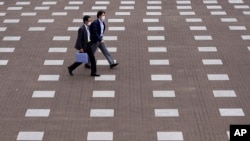A nationwide state of emergency imposed in Japan to blunt the coronavirus pandemic has been lifted with the exception of Tokyo and several other regions.
Thursday’s announcement by Prime Minister Shinzo Abe came after a special coronavirus task force approved a plan to lift the decree for 39 of 47 prefectures.
Abe initially declared a 30-day state of emergency on April 7 for Tokyo and six other prefectures, including the central port city of Osaka, as the number of COVID-19 infections began to rise. He extended the measure nationwide just a few days before it was set to expire.
The prime minister said he was lifting the decree for most of the nation as the number of new infections are on the decline, but will keep it in force for Tokyo, Osaka, Hokkaido and the three other prefectures. The decree expires on May 31.
Japan has reported just over 16,000 confirmed cases of COVID-19 infections with just over 680 deaths, a situation that has overwhelmed the country’s healthcare system, hobbled its economy and forced it to postpone the Tokyo Summer Olympic Games for a year.
The emergency declaration gives local authorities the legal power to call on its citizens to stay at home and to ask schools and businesses to close, but stops short of imposing a legally binding nationwide lockdown. Japan’s post-World War II constitution, which weighs heavily in favor of civil liberties, does not empower the government to impose a mandatory quarantine.
Japan Lifts COVID State of Emergency for Much of Country




